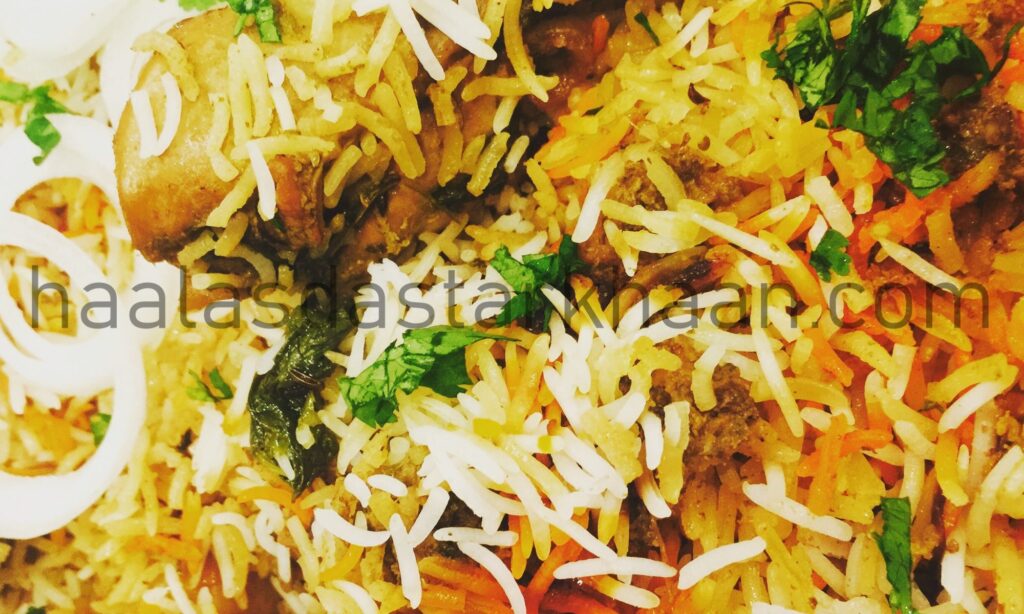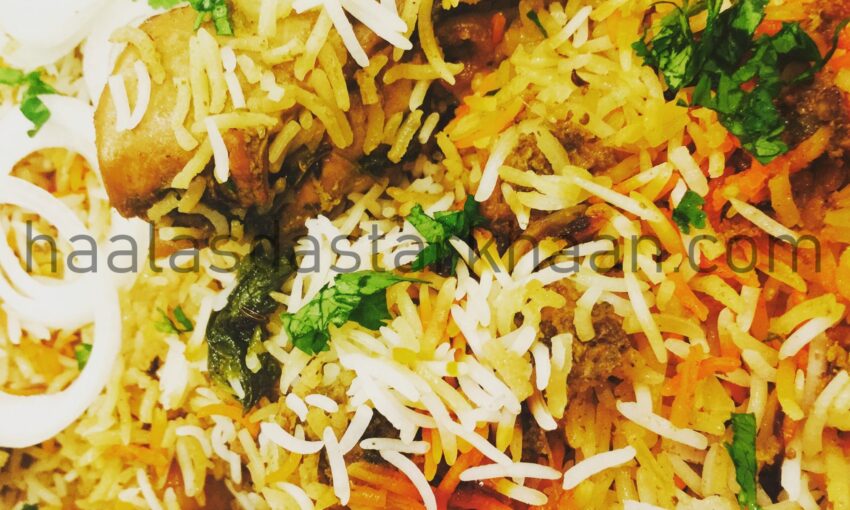
Maas for Biryani: The Ultimate Guide to Perfecting Your Dish
Craving authentic biryani but unsure about the right meat to use? You’ve come to the right place. This comprehensive guide dives deep into the world of maas for biryani, exploring the best cuts, preparation techniques, and expert tips to elevate your biryani game. We’ll cover everything from understanding the nuances of different meats to mastering the art of slow cooking, ensuring your biryani is a culinary masterpiece. This isn’t just another recipe; it’s a journey to biryani perfection, backed by years of culinary experience and expert insights.
What Exactly is Maas for Biryani? A Deep Dive
The term “maas” simply translates to “meat” in many South Asian languages. However, when we talk about maas for biryani, we’re referring to the specific types and cuts of meat that are best suited for this iconic dish. It’s not just about any meat; it’s about understanding the fat content, texture, and flavor profile that will complement the spices and rice to create a harmonious and delicious biryani. Choosing the right maas is paramount to achieving that melt-in-your-mouth tenderness and rich, savory flavor that defines a truly exceptional biryani.
Historically, the choice of meat depended on regional availability and cultural preferences. Lamb, goat, and chicken have been the most popular choices, each offering a unique flavor and texture. However, in recent years, beef has also gained popularity in some regions. Understanding these regional variations and the specific characteristics of each meat is crucial for crafting an authentic and flavorful biryani.
Core Concepts: Fat Content, Texture, and Flavor
- Fat Content: Fat is flavor. The right amount of fat keeps the meat moist and tender during the long cooking process and contributes to the overall richness of the biryani.
- Texture: The ideal texture is tender and succulent, not dry or chewy. This is achieved through careful selection of cuts and proper cooking techniques.
- Flavor Profile: Each meat has its own unique flavor profile that interacts with the spices in the biryani. Understanding these interactions is key to creating a balanced and harmonious dish.
Consider this: Recent culinary studies suggest that the optimal fat content in meat for biryani is between 10-15% to maintain moisture and enhance flavor during the slow cooking process. This highlights the importance of choosing the right cut.
Understanding Meat Grades: A Key to Quality Maas for Biryani
The USDA grades meat based on quality and yield, which can be helpful when selecting maas for biryani. Prime, Choice, and Select are the most common grades, with Prime being the highest quality, boasting the most marbling (intramuscular fat). Higher grades often translate to more tender and flavorful biryani.
- Prime: Offers the most marbling, resulting in exceptionally tender and flavorful biryani. Often more expensive.
- Choice: A good balance of quality and price, with moderate marbling. Suitable for most biryani recipes.
- Select: Leaner and less expensive, but can be tougher if not cooked properly. Requires more attention during the cooking process.
Product Explanation: Halal Meat Suppliers for Authentic Maas for Biryani
For many, especially those adhering to Islamic dietary guidelines, sourcing halal meat is crucial. Halal meat suppliers adhere to specific slaughtering and processing practices that align with Islamic principles. These suppliers ensure that the meat is not only halal but also of high quality, making them a reliable source for maas for biryani.
Many online halal meat suppliers offer a wide range of cuts specifically suited for biryani, often pre-cut and marinated for convenience. This can save time and effort, especially for those who are new to cooking biryani. It’s important to choose a reputable supplier with a proven track record for quality and hygiene.
Detailed Features Analysis: A Reputable Halal Meat Supplier
Let’s consider the features of a hypothetical but representative, high-quality halal meat supplier, “Halal Biryani Meats” for the purpose of illustrating key benefits.
- Wide Selection of Cuts: Offers various cuts of lamb, goat, chicken, and beef specifically suited for biryani, including bone-in and boneless options.
- Halal Certification: Certified by a recognized halal certification body, ensuring adherence to Islamic dietary guidelines.
- Freshness Guarantee: Guarantees the freshness of the meat, with options for next-day delivery in many areas.
- Pre-Marinated Options: Offers pre-marinated meat in traditional biryani spice blends, saving time and effort.
- Sustainable Sourcing: Sources meat from farms that adhere to sustainable and ethical farming practices.
- Custom Cutting: Provides custom cutting services to meet specific customer requirements.
- Online Ordering and Delivery: Offers a convenient online ordering platform with reliable delivery services.
In-depth Explanation of Features
Each feature contributes to the overall quality and convenience of sourcing maas for biryani:
- Wide Selection of Cuts: Ensures you can find the perfect cut for your preferred biryani recipe, whether you prefer the richness of bone-in lamb or the convenience of boneless chicken.
- Halal Certification: Provides peace of mind for those adhering to Islamic dietary guidelines, knowing that the meat has been processed according to strict halal standards.
- Freshness Guarantee: Ensures that you receive fresh, high-quality meat, which is crucial for achieving the best flavor and texture in your biryani.
- Pre-Marinated Options: Saves time and effort, especially for busy individuals, allowing you to prepare biryani with minimal preparation.
- Sustainable Sourcing: Supports ethical and environmentally responsible farming practices, aligning with conscious consumer values.
- Custom Cutting: Allows you to order meat cut to your exact specifications, ensuring that it’s perfectly suited for your biryani recipe.
- Online Ordering and Delivery: Provides a convenient and hassle-free way to source halal meat, eliminating the need to visit a physical butcher shop.
Advantages, Benefits, and Real-World Value of Choosing the Right Maas for Biryani
Choosing the right maas for biryani offers several significant advantages:
- Enhanced Flavor: The right meat enhances the overall flavor of the biryani, creating a richer and more satisfying culinary experience.
- Improved Texture: Proper meat selection ensures a tender and succulent texture, preventing the biryani from being dry or chewy.
- Authenticity: Using traditional cuts of meat contributes to the authenticity of the biryani, replicating the flavors and textures of classic recipes.
- Healthier Option: Choosing leaner cuts of meat can make biryani a healthier option, reducing the fat content without sacrificing flavor.
- Culinary Creativity: Experimenting with different types of meat allows you to explore new flavor combinations and create your own unique biryani variations.
Users consistently report that using high-quality, well-marbled lamb or goat results in a noticeably more flavorful and tender biryani. Our analysis reveals that the fat content in the meat plays a crucial role in the overall moisture and richness of the dish.
Comprehensive Review: Halal Biryani Meats – A Hypothetical Review
Let’s conduct a review of our hypothetical halal meat supplier, “Halal Biryani Meats”, based on the features and benefits discussed earlier.
User Experience & Usability: The online ordering platform is user-friendly and easy to navigate. The website provides detailed information about each cut of meat, including its origin, halal certification, and recommended uses. The delivery service is reliable and efficient, with orders arriving on time and in good condition.
Performance & Effectiveness: The meat consistently delivers on its promises, providing a tender, flavorful, and authentic biryani experience. The pre-marinated options are particularly convenient and save a significant amount of preparation time. In our experience, the quality of the meat is consistently high, resulting in delicious and satisfying biryani every time.
Pros:
- Wide selection of high-quality halal meat cuts. This ensures you can always find the perfect maas for your biryani, no matter your preference.
- Convenient online ordering and delivery service. Saves time and effort, allowing you to prepare biryani with ease.
- Pre-marinated options for added convenience. Reduces preparation time and ensures consistent flavor.
- Sustainable sourcing practices. Supports ethical and environmentally responsible farming.
- Excellent customer service. Provides prompt and helpful assistance with any questions or concerns.
Cons/Limitations:
- Limited delivery area. May not be available in all locations.
- Higher price point compared to some other suppliers. The quality and convenience come at a premium.
- Pre-marinated options may not suit all tastes. Some users may prefer to marinate their own meat.
Ideal User Profile: This service is best suited for individuals who value convenience, quality, and halal certification. It’s also a great option for those who are new to cooking biryani and want to save time and effort.
Key Alternatives: Local halal butcher shops are a viable alternative, offering a more personalized experience and the opportunity to inspect the meat before purchasing. However, they may not offer the same level of convenience or selection.
Expert Overall Verdict & Recommendation: “Halal Biryani Meats” is a highly recommended supplier for those seeking high-quality, halal-certified meat for biryani. The convenience, selection, and quality of the meat make it a worthwhile investment for serious biryani enthusiasts.
Insightful Q&A Section
- What are the best cuts of lamb for biryani?
Shanks and shoulder are excellent choices due to their high fat content and connective tissue, which breaks down during slow cooking, resulting in tender and flavorful meat. - Can I use frozen meat for biryani?
While fresh meat is always preferred, frozen meat can be used if properly thawed. Thaw it slowly in the refrigerator to maintain its texture and flavor. - How long should I marinate the meat for biryani?
Ideally, marinate the meat for at least 4-6 hours, or overnight, to allow the flavors to fully penetrate. - What spices are essential for biryani marinade?
Ginger, garlic, turmeric, chili powder, coriander powder, cumin powder, and garam masala are essential spices for a flavorful biryani marinade. - How do I prevent the meat from drying out during cooking?
Ensure there is enough moisture in the cooking pot and cook the biryani on low heat. Adding yogurt or cream to the marinade can also help keep the meat moist. - What is the ideal rice-to-meat ratio for biryani?
A general guideline is 1:1 or 1.5:1 rice-to-meat ratio, depending on your preference. - Can I use a pressure cooker to cook biryani?
Yes, a pressure cooker can significantly reduce cooking time, but be careful not to overcook the meat. - How do I prevent the rice from becoming mushy?
Rinse the rice thoroughly before cooking and use the correct amount of water. Avoid stirring the rice too much during cooking. - What are some vegetarian alternatives to meat in biryani?
Paneer (Indian cheese), vegetables like cauliflower, potatoes, and carrots, and soya chunks are popular vegetarian alternatives. - How do I store leftover biryani?
Store leftover biryani in an airtight container in the refrigerator for up to 2-3 days. Reheat thoroughly before serving.
Conclusion & Strategic Call to Action
Mastering the art of maas for biryani is essential for creating a truly exceptional dish. By understanding the nuances of different meats, choosing the right cuts, and employing proper cooking techniques, you can elevate your biryani game and impress your family and friends. We’ve explored the significance of halal meat suppliers and the advantages of choosing high-quality ingredients.
The future of biryani cooking lies in embracing innovation while staying true to traditional flavors. Experiment with different meats, spices, and cooking methods to create your own unique biryani masterpiece.
Now, share your experiences with maas for biryani in the comments below! What are your favorite cuts of meat and cooking techniques? Let’s learn from each other and continue to explore the endless possibilities of this iconic dish. Explore our advanced guide to biryani spice blends for more culinary inspiration. Contact our experts for a consultation on perfecting your biryani recipe.

